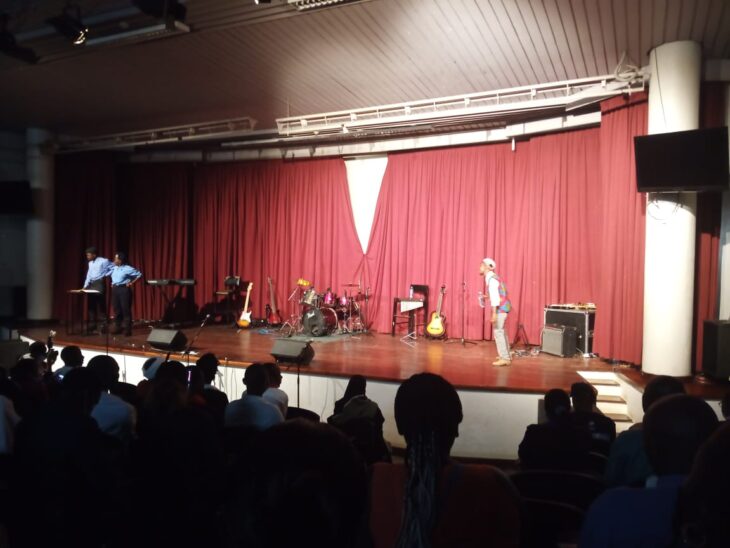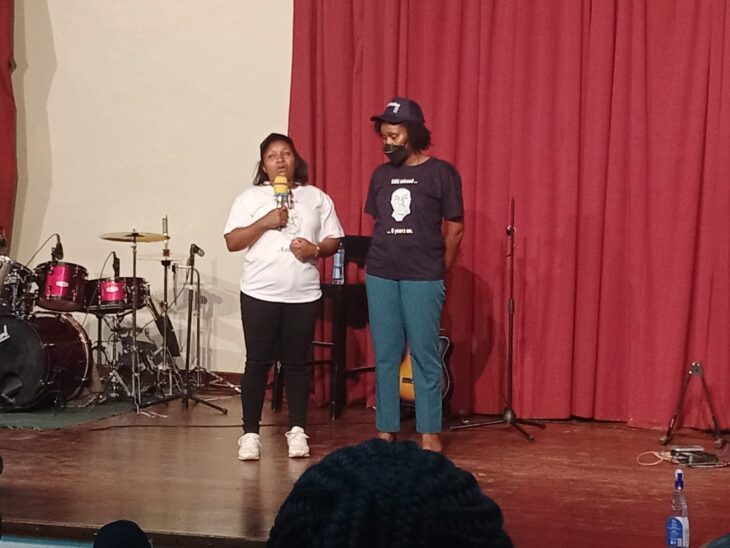NAIROBI, Kenya, Jun 23-Emotions ran high at the 6th commemoration since the abduction and brutal Killings of Lawyer Willy Kimani, his client Joseph Mwenda and their driver Josephat Muiruri, as families whose kin have suffered a similar fate narrate their painful ordeal chasing after justice.
For them, it has become an open wound for years and others have passed on, hoping they will get justice for their children.
The event was held at the Kenya National Museum auditorium, where hundreds of friends, relatives and former colleagues at the International Justice Mission-Kenya paid tribute to the departed souls under the hands of law enforcers, but also demanded justice.
It’s a concert by a group of young city artists that reawakened raw emotions for some family members, creating flashback memories of how their kins were tortured and later killed, by those who should have protected them.
In the skit, a young man is seen being executed by police. He leaves behind a young child; a tale too familiar to families of victims of police killings.
One lady lost his two sons to police killings 7 years ago and was left with four grandchildren.
The murder files are gathering dust at the Independent Policing Oversight Authority, she said.
But they are those who were not lucky as they died way before they even got married to have a family of their own.
Like in the case of Muiruri, he was killed a few months before his intended wedding. He was only 27-year-old.
“I usually wish he left us a child,” the late Muiruri’s sister Stella said while narrating how the 6 years of wait for justice has drained her emotionally, alongside her siblings.
Since they were orphaned at a young age, Muiruri, the sister said she was like her own sister.
“I raised him since he was in class 6,” she said.

Her life was cut short on June 13, 2016, when alongside lawyer Kimani and Mwenda were abducted and killed
He was pursuing justice against a senior police officer.
“It is very painful,” she said.
The case has taken a toll on the well-being of her siblings, she said.
One of her brothers, whom they have together attended court sessions, developed health complications and recently succumbed to them.
He had hypertension and diabetes, conditions she said developed after the brother was killed.
Another one, she said is battling depression over the case.
“He has become a drunkard,” she said.
“Every time he drinks, he usually goes to the police station and asks officers to kill him, as they did to his brother.”
The event was also attended by a representative of the National Police Service Internal Affairs Unit, a critical player in the pursuit of justice for many victims.
“We don’t condone this form of brutality,” the IAU representative, a lead investigator said.
IJM-Kenya Country Director Benson Shamalla asked the judiciary to ensure cases of police killings are expeditiously heard and determined.
He decried 6 years after the Mavoko 4 were killed, there are many more cases being documented.
Through the Missing Voices initiative, IJM-Kenya in collaboration with more than 15 other organizations have documented hundreds of enforced disappearance and extrajudicial killings over the years.
“The only thing that has changed is how they do it,” Shamalla said in reference to the growing cases of police killings.
In 2019, the Missing Voices documented 145 cases of police killings, in 2020 they recorded 158 cases and 10 cases of enforced disappearance.
In 2021, Missing Voices documented 187 cases of police killings and 32 enforced disappearances.
This year alone, Shamalla said the Missing Voices has documented 50 cases of police killings and 3 cases of enforced disappearance.
“IPOA received 123 cases of deaths by police action, 46 deaths in police custody and 28 cases of enforced disappearance in 2021 alone,” the IJM-Kenya boss said.
“The data confirms a steady increase in cases of enforced disappearance and extrajudicial killings in the country giving rise to the cry for justice now.”
In the case of lawyer Kimani, Mwenda and Muiruri, 46 prosecution witnesses testified.
At least 34 defence witnesses testified.
Justice Jessie Lessit is currently analysing 117 exhibits and evidence given by 46 witnesses.
Crucial exhibits tabled before the judge by the prosecution include phone data records, mobile phone companies’ cell sites analysis and DNA samples.
Other pieces of evidence critical in the trial include a confession statement given by the fifth accused and evidence generated from CCTV cameras from the high-tech Communication Command Centre(C3) and the motor vehicle recognition technology.
The accused are Administration Police officers Fredrick Leliman, Stephen Cheburet, Silvia Wanjiku and Leonard Mwangi.
Justice Lessit said she has written over 6,000 pages, which she said is the biggest file in her career.
Both prosecution and defence teams made their final submissions on February 10, with each side urging the judge to rule in their favour.
“As human rights defenders we will continue to show solidarity to the victims and survivors of this violence and call for the swift determination of their cases for justice to prevail,” Shamalla said.
Want to send us a story? Contact Shahidi News Tel: +254115512797 (Mobile & WhatsApp)


